That Hoarder: Overcome Compulsive Hoarding
Hoarding disorder is stigmatised and people who hoard feel vast amounts of shame. This podcast began life as an audio diary, an anonymous outlet for somebody with this weird condition. That Hoarder speaks about her experiences living with compulsive hoarding, she interviews therapists, academics, researchers, children of hoarders, professional organisers and influencers, and she shares insight and tips for others with the problem. Listened to by people who hoard as well as those who love them and those who work with them, Overcome Compulsive Hoarding with That Hoarder aims to shatter the stigma, share the truth and speak openly and honestly to improve lives.
Episodes
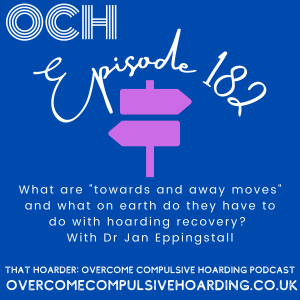
Friday Mar 28, 2025
Friday Mar 28, 2025
Come to a Dehoarding Accountability Zoom Session: http://www.overcomecompulsivehoarding.co.uk/ticket
Subscribe to the podcast: https://www.overcomecompulsivehoarding.co.uk/subscribe
Podcast show notes, links and transcript: http://www.overcomecompulsivehoarding.co.uk/
Today, I'm joined by Dr Jan Eppingstall to unpack "towards moves" and "away moves" in the context of hoarding. These terms might sound unusual, but they're crucial for understanding behaviour in Acceptance and Commitment Therapy (ACT) and how they relate to our values. It's all about recognising whether our actions are leading us closer to what matters or pulling us further away, and we'll be exploring how to identify and pivot those choices.
Introduction to Towards Moves and Away Moves
Definition and explanation of the concept.
The relevance of these moves in dealing with hoarding disorder.
Initial thoughts on the impact of small actions.
Examples in a Hoarding Context
Away moves (e.g., keeping craft supplies, avoiding recognising chaos).
Towards moves (e.g., donating supplies, acknowledging home environment issues).
Explanation of how values influence these moves.
Role of Values in Decision Making
Importance of determining personal values.
How values affect choices and provide motivation.
Impact of materialism and societal pressures on values.
Cognitive Fusion
Explanation and examples of cognitive fusion.
The effect of tightly held beliefs on reality and actions.
Discussion of accuracy vs. helpfulness of thoughts.
Flexibility vs. Rigidity and Perfectionism
Psychological inflexibility and societal expectations.
The struggle between personal values and societal pressures.
The concept of emotional flexibility and its importance.
Recognising Towards and Away Moves
Strategies for acknowledging and reflecting on these moves.
Importance of awareness in decision-making processes.
Dopamine and Pleasure vs. Meaning
The role of dopamine in pleasure and motivation.
Discussion on short-term pleasure vs. long-term meaning.
How these insights influence approach and avoidance behaviours.
Making Changes and Addressing Moves
Creating “if-then” plans to anticipate moves.
Reflecting on decisions and their outcomes.
Recognising patterns and using past experiences to guide future actions.
Role of Helpers in Towards and Away Moves
Identification and importance of helpers like goal setting and values clarification.
Challenges faced by individuals with attentional deficits.
Votes for the Person You Want to Be
Connection between choices and self-identity.
Concept of actions as votes for future selves.
First Steps to Take More Towards Moves
Starting with value clarification exercises.
Questions to help determine what’s important personally.
Encouragement to explore inner motivations and experiences.
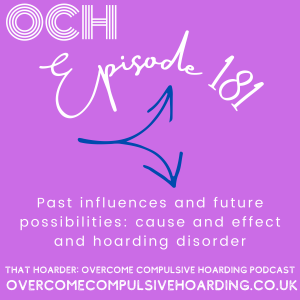
Friday Mar 21, 2025
Friday Mar 21, 2025
Come to a Dehoarding Accountability Zoom Session: http://www.overcomecompulsivehoarding.co.uk/ticket
Subscribe to the podcast: https://www.overcomecompulsivehoarding.co.uk/subscribe
Podcast show notes, links and transcript: http://www.overcomecompulsivehoarding.co.uk/
Podcasthon
Mind, the mental health charity
Support Mind
During a recent drive with a perfectly curated playlist, I had a revelation about cause and effect, particularly how our past behaviours and experiences contribute to both our challenges and our successes. I talk about having a compassionate understanding of how we've arrived at our current situation and how small, mindful actions today can shape a more positive future. The episode also features a discussion on Podcasthon and highlights the UK mental health charity Mind.
Explanation of Podcasthon: A week where podcasts highlight a charity.
Mind Charity: Focus on the mental health charity Mind in the UK.
Audio Clip: Sharing a video of Mind's work, with a translation of a Welsh sentence.
Cause and Effect Discussion
Insight through Music: Personal anecdote about creating a playlist for a long drive.
The role of personal actions in positive outcomes.
Life and Hoarding: Exploring causes of both positive and negative outcomes in life.
Factors influencing hoarding: Trauma, scarcity, and mental health challenges.
Behaviour evolution: Hoarding behaviours becoming normal over time.
Impact of Life Experiences
Examining past experiences and their contributions to current behaviours.
Considering past without judgment as a way to understand hoarding.
Facing Reality
Objective Assessment: Evaluating the current state of living conditions.
Navigating feelings like anger, sadness, and bitterness.
Future Implications
Positive Actions: How they can shape a better future.
Accountability and Responsibility: Recognising the impact of present actions.
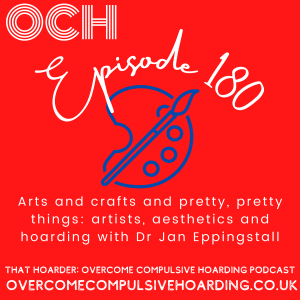
Friday Mar 14, 2025
Friday Mar 14, 2025
Come to a Dehoarding Accountability Zoom Session: http://www.overcomecompulsivehoarding.co.uk/ticket
Subscribe to the podcast: https://www.overcomecompulsivehoarding.co.uk/subscribe
Podcast show notes, links and transcript: http://www.overcomecompulsivehoarding.co.uk/
In this episode, I'm joined by Dr Jan Eppingstall to explore a fascinating angle on hoarding: its artistic side. We'll tackle the connection between creativity and hoarding, including why so many people who hoard are into arts and crafts, and diving into how people who hoard might view their possessions in an unusually aesthetic light. Jan shares insights from both clinical experience and research, offering a fresh perspective on the parallels between art and accumulation. Whether you're a creative type or just curious about the psychology behind collecting, this conversation will give you plenty to think about.
Curiosity: Example of using curiosity to cope with pain.
Gratitude: Using the Finch app to practice gratitude daily.
Journaling: Imperfect journaling as a new approach to managing emotions.
Arty, Crafty Side of Hoarding
Trends seen in clients regarding art and hoarding
The challenge of managing craft supplies in people who hoard
Analysing Creativity and Hoarding
Comparison to detectives and acute perception
Consideration of feeling overlooked
Struggles with Crafting and Perfectionism
Challenges in starting and completing craft projects
Study on Artists and Hoarding
Traits shared by studio artists and people who hoard
ADHD and executive dysfunction parallels
Art and Beauty in Hoarding
Tendency to keep beautiful things
Struggles with displaying or appreciating collected items
Analysis of Andy Warhol's Accumulation
Discussion of Warhol’s collection as art vs. hoarding
Socioeconomic and behavioural aspects of collecting vs. hoarding
Aesthetics and Inclusion in Hoarding
Discussion of under-inclusiveness in categorising objects
Exploration of seeing beauty in ordinary objects
Potential Neurodevelopmental Aspects of Hoarding
Insights from MRI study
Brain regions potentially linked to hoarding behaviours
Using Art to Represent Hoarding Space
Artists using clutter and hoarding as themes in art
Questioning the nature of representing hoarding through art
Fear of Sterile and Soulless Homes
Addressing the fear that tidiness equals lack of personality
Discussing clutter core and maximising aesthetic displays
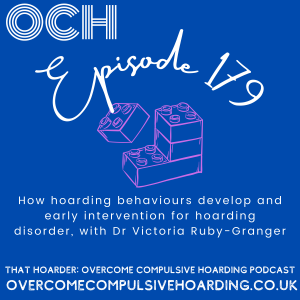
Friday Mar 07, 2025
Friday Mar 07, 2025
Come to a Dehoarding Accountability Zoom Session: http://www.overcomecompulsivehoarding.co.uk/ticket
Subscribe to the podcast: https://www.overcomecompulsivehoarding.co.uk/subscribe
Podcast show notes, links and transcript: http://www.overcomecompulsivehoarding.co.uk/
In this episode, I'm chatting with Dr. Victoria Ruby-Granger, a psychologist at De Montfort University who has researched how hoarding behaviours develop and the potential for early intervention. We explore the importance of looking beyond physical clutter to understand what possessions mean for those with hoarding tendencies and discuss the role of trauma, loss and life transitions. Plus, we touch on the challenges and potential pathways for early intervention in children and young people.
Dr. Victoria Ruby-Granger's Path to Studying Hoarding
Influence of TV programmes about hoarding.
Curiosity about the development of hoarding behaviours.
Research on Hoarding Behaviours and Childhood
Discussion on hoarding behaviours beginning in childhood or adolescence.
Experiences shared by research participants.
Understanding 'Struggling to Manage'
Explanation of the concept derived from research.
Methods used by Dr. Victoria Ruby-Granger in her research.
Qualitative study and grounded theory methodology.
Patterns of Hoarding Development
Managing possessions and life.
Emotional attachments and meanings of possessions.
Impact of life transitions on hoarding behaviour.
Overcoming Hoarding Challenges
Importance of support beyond possessions
Identity and functioning challenges for individuals with hoarding disorder.
Early Intervention in Hoarding
Difficulty in identifying people who need early intervention.
Importance of awareness and understanding childhood behaviours.
Diagnostic Criteria and Support Challenges
Discussion on current diagnostic criteria for hoarding disorder.
Difficulties in accessing support without a diagnosis.
Potential Patterns and Findings in Dr. Victoria Ruby-Granger's Research
Emotional attachments and decision-making reluctance.
Preferences for discarding possessions through certain methods.
Advice for Parents about children showing hoarding behaviours
Recommendations for parents of children displaying hoarding-related behaviours.
Importance of communication and understanding the emotional meanings attached to items.
Emphasis on trauma and loss in hoarding behaviours.
Importance of understanding personal experiences in hoarding
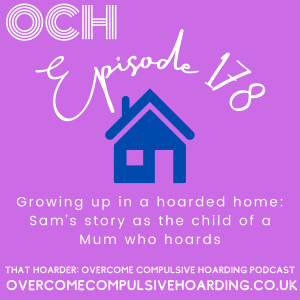
Friday Feb 28, 2025
Friday Feb 28, 2025
Come to a Dehoarding Accountability Zoom Session: http://www.overcomecompulsivehoarding.co.uk/ticket
Subscribe to the podcast: https://www.overcomecompulsivehoarding.co.uk/subscribe
Podcast show notes, links and transcript: http://www.overcomecompulsivehoarding.co.uk/
In this episode I chat with Sam, who speaks movingly about growing up with a mother who hoards. Now 28, Sam reflects on the claustrophobic environment, the impact on their self-esteem and organisation, and the ongoing journey to rebuild a relationship with food, space, and self-worth. Whether you're a hoarder, the child of somebody who hoards, or you know someone who is, Sam's story offers a vital perspective on living through - and beyond - the hoard.
Sam’s experience growing up in a hoarded home
Importance of understanding perspectives of those affected by hoarding
Sam’s Childhood Experience
Description of upbringing in a hoarded home
Emotional impact and feelings of claustrophobia and anxiety
Lack of emotional and physical space
Experiences of shame and comparison with peers
Coping Mechanisms and Effects on Daily Life
Sam's view of their home as an obstacle course
Impact of hoarding on family relationships
Lack of privacy and its influence on personal development
Impact on Self-Esteem and Mental Health
Struggle with self-esteem and self-care
Connection between environment and depression
Feelings of negativity and isolation
School and Social Interactions
Effect on academic performance and organisational skills
Challenges in completing schoolwork
Experiences with friends visiting the home and related anxieties
Adolescence and Growing Awareness
Anger and frustration during teenage years
Lack of external intervention and support
Missed opportunities for professional help
External Perception and Professional Insight
Outside family and societal perceptions of hoarding
Drip-feeding experiences to others and feeling of overwhelming others
Relationship with Food and Nutrition
Negative perceptions of food due to spoiling and smells
Ongoing struggle with eating certain foods, particularly fruit
Rebuilding a relationship with food as an adult
Leaving the Home and Independence
Sam’s experience and decision to move out at 20
Challenges and processes involved in leaving the parental hoarded home
Continued responsibilities in a second hoarded home
Long-term Effects on Sam’s Adult Life
Influence on career choice and support work with young carers
Ongoing challenges with personal organisation and self-care
Struggles with mental health and burnout
Sam’s Relationship with Family
Complex relationship dynamics with parents
Lack of understanding from parents regarding Sam’s struggles and decisions
Reflection on parental insight into hoarding and its effects on family
Current Relationship with Hoarding and Cleaning
Sam’s approach to possessions
Emotional responses to cleaning and organising tasks
Developing the skillset for maintaining an organised living space
Message for Others Experiencing Similar Situations
Encouragement for other young carers and children of hoarders
Importance of self-worth and identity outside of hoarding stigmas
Strategies for mental health and personal growth
Final Thoughts and Reflections
Reflections on how sharing and exploration helps understanding
Hope for the interview to be beneficial to listeners with similar experiences
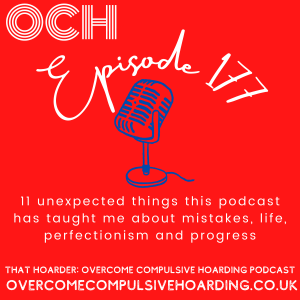
Friday Feb 21, 2025
Friday Feb 21, 2025
Come to a Dehoarding Accountability Zoom Session: http://www.overcomecompulsivehoarding.co.uk/ticket
Subscribe to the podcast: https://www.overcomecompulsivehoarding.co.uk/subscribe
Podcast show notes, links and transcript: http://www.overcomecompulsivehoarding.co.uk/
Today, I'm reflecting on 11 unexpected lessons I've picked up since starting this podcast, which go beyond just understanding hoarding disorder. From learning the power of showing progress rather than perfection, to discovering the benefits of stepping out of my comfort zone, I'll share insights that have influenced not just my journey with hoarding, but life as a whole.
Let's see how the themes of mistakes, progress, and learning can apply to anyone seeking positive change.
Importance of showing progress instead of aiming for perfection
Personal struggle with early episodes and progression over time
Decision to keep early episodes live as a reflection of journey and growth
Examining Contradictions
Realisation of contradictions in personal life versus podcasting
Applying podcast editing philosophy to home tidying
Capabilities and Achievements
Realisation of being able to do things previously thought impossible
Learning from incremental progress and its application to life
Comfort Zones
Exploring stepping outside of comfort zones
The rewards of nudging the edges and expanding comfort zones slowly
Learning and Growth
Starting from minimal knowledge and continuously learning
Academic engagement and gaining comprehensive understanding
Sticking to a Routine
Maintaining a consistent schedule and routine with the podcast
Role of accountability and motivation in sticking to a routine
Adaptability and Change
Ability to learn, adapt, and tweak processes over time
Application of flexibility learned from podcasting to personal life
Community and Accountability
Impact of accountability and community support on podcasting and life
Building mutual support through interactions and feedback
Facing Mistakes and Reality
Embracing mistakes and authenticity rather than striving for flawlessness
Shifting perspective on self-perceived failures
Respect and Compassion from Others
Receiving respect from guests and listeners despite personal doubts
Impact on self-compassion and self-respect
Transferability of Learning
Applying lessons learned in podcasting to other areas of life
Recognising that growth in one area can benefit others
Reflections on the transformative impact of the podcast on life
Encouragement to pursue growth and new experiences beyond direct goals
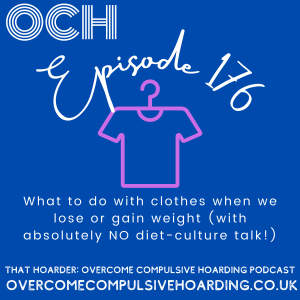
Friday Feb 14, 2025
Friday Feb 14, 2025
Come to a Dehoarding Accountability Zoom Session: http://www.overcomecompulsivehoarding.co.uk/ticket
Subscribe to the podcast: https://www.overcomecompulsivehoarding.co.uk/subscribe
Podcast show notes, links and transcript: http://www.overcomecompulsivehoarding.co.uk/
In today's episode, I talk about the practical challenges of handling clothes when losing or gaining weight, without promoting or criticising body size changes – this is a diet-culture free zone! I look at the emotional, nostalgic, and practical hurdles in letting go of clothes that no longer fit and offer advice on maintaining a well-balanced wardrobe while managing current size transitions. Like, what do we buy in our new size?! Plus, I'll provide practical tips on selling or donating old clothes and how to avoid over-accumulating in your new size.
Handling Clothes When Gaining or Losing Weight
Experience with Weight Fluctuation
Emotional and Practical Challenges of Clothes That No Longer Fit
Challenges of Discarding Clothes
Emotional Attachment to Clothes
Difficulty in Letting Go of Clothes with Memories or Associations
Factors Influencing the Decision to Keep or Discard Clothes
Potential Future Weight Fluctuations
Emotional Attachments
The Sunk Cost Fallacy
Guilt About Waste
Strategies for Managing Clothes When Weight Changes
Building the Dehoarding Muscle
Selling vs. Donating Clothes
Setting Parameters for Clothing Storage
Practical Solutions for Current Clothing Needs
Shopping Your Own Stuff
Gradual Replacement Strategy
Mindful Purchasing Decisions
The Liberating Aspects of Letting Go of Clothes
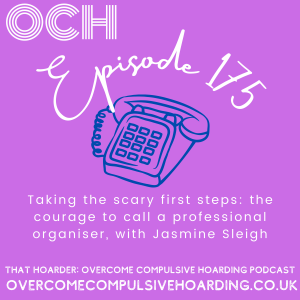
Friday Feb 07, 2025
Friday Feb 07, 2025
Come to a Dehoarding Accountability Zoom Session: http://www.overcomecompulsivehoarding.co.uk/ticket
Subscribe to the podcast: https://www.overcomecompulsivehoarding.co.uk/subscribe
Podcast show notes, links and transcript: http://www.overcomecompulsivehoarding.co.uk/
In this episode, I'm joined by Jasmine Sleigh, professional declutterer, as we discuss the daunting first steps of reaching out for professional help in tackling hoarding. Jasmine shares insights into what prompts individuals to make that initial call and the courage it takes, alongside practical strategies for working with organisers. Tune in for a thoughtful conversation on overcoming fears and building trust for positive change in managing clutter.
Inviting Professional Help
Jasmine explains common motivators for people to seek help
Specific incidents or realisations prompting action
Example scenarios like misplaced items or repairs
The Initial Call to a Professional Organiser
What typically prompts the call for professional help
Jasmine's perspective on admiration for those who reach out
The importance of taking calls seriously and with empathy
Engaging with Potential Clients
Approach to initial conversations with potential clients
Building trust and understanding the client's situation
Establishing client needs and potential outcomes
Assessing the Client’s Home
How Jasmine gathers information about the client's home
Importance of assessing without judgment
Considering client interaction with their items and living space
Professional Organiser-Client Dynamics
Respecting clients’ preferences and leading decisions
Balancing professional insight with client autonomy
Working towards the client's goals and priorities
Process from Inquiry to Working Together
Steps from initial inquiry to in-home visit
Managing client expectations and realities
Ensuring client comfort and readiness
In-Home Visit Experience
Jasmine’s mindset and approach during a home visit
Avoiding overwhelm and maintaining professionalism
Logistical and emotional assessments of the client’s environment
Judgment and Perception in the Decluttering Process
Being conscious of non-verbal cues and judgments perceived by clients
Strategies for maintaining client comfort and trust
Determining Fit and Referrals
Assessing fit between client and professional organiser
Referring clients to other professionals when appropriate
Dealing with Client Motivations and External Pressures
Addressing clients seeking help due to external pressures
Finding a balance between urgency and client readiness
Ensuring Positive Outcomes and Encouraging Future Engagement
Creating a sense of achievement for the client
Fostering positive experiences to encourage future self-help
Challenges and Responsibilities of Professional Organisers
Ethical responsibilities and managing client expectations
Building trust for effective collaboration
Personal Reflections and Habits for Mental Health
Jasmine shares personal habits that support her mental health
Reflection on the importance of reading and self-care activities
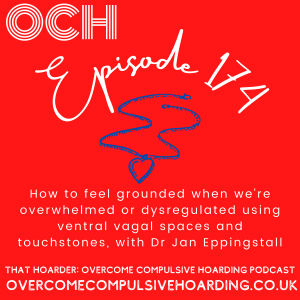
Friday Jan 31, 2025
Friday Jan 31, 2025
Come to a Dehoarding Accountability Zoom Session: http://www.overcomecompulsivehoarding.co.uk/ticket
Subscribe to the podcast: https://www.overcomecompulsivehoarding.co.uk/subscribe
Podcast show notes, links and transcript: http://www.overcomecompulsivehoarding.co.uk/
In today's episode, Dr Jan Eppingstall and I explore how to create a ventral vagal space or touchstone to help us regulate our emotions, drawing inspiration from the work of Deb Dana and polyvagal theory. We look at how we can find or create areas within our home, and objects we can use on the go, that provide safety and connection, allowing us to feel grounded and manage overwhelming moments. We'll look at the emotional significance of objects, avoiding those that glower at us, and instead creating spaces filled with comfort and warmth.
Creating Your Own Ventral Vagal Space
Permission Slip segment
Discussion about photographic portraits
Emotions associated with the portraits
Objects as Memories
Significant memories vs. happy memories
Harriet Impey's notion of "glowering" objects
Emotional Impact of Objects
Portraits as a reminder of insecurity
Ventral Vagal Space Concept
Use of Deb Dana's work in polyvagal theory
Connection between emotional safety and physical space
Explanation of Polyvagal Theory
Breakdown of the nervous system's stages: ventral vagal, sympathetic, and dorsal vagal
Relevance of Polyvagal Theory to Hoarding
Trauma and its relation to object attachment
Challenges of decision-making in a cluttered environment
Deb Dana's Home Analogy - Comparison of home systems to body's autonomic systems
Integration needed for a "full life" and connection
Practical Application of Ventral Vagal Spaces
Creating nourishing home spaces
Abundance
Importance of Touchstones
Explanation and significance of touchstones
Examples of personal or portable calming items
Creating a Ventral Vagal Space or Touchstone
Starting small by identifying objects that bring safety and contentment
Using childhood memories to influence current safe spaces
Applications and Benefits
Using the space for emotional regulation
Touchstones as portable reminders of safety
Recognising objects that already serve as touchstones
Importance of awareness and observation in identifying touchstones
Utilising Resources for Grounding
Examples of resources: lava lamps, messages, certain sounds
Strategies for implementing these resources in daily life
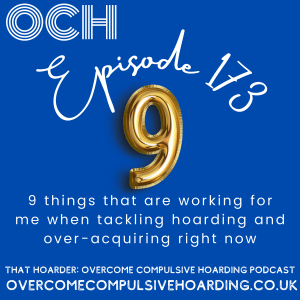
Friday Jan 24, 2025
Friday Jan 24, 2025
Sign up for the newsletter: http://www.overcomecompulsivehoarding.co.uk/newsletter
Come to a Dehoarding Accountability Zoom Session: http://www.overcomecompulsivehoarding.co.uk/ticket
Subscribe to the podcast: https://www.overcomecompulsivehoarding.co.uk/subscribe
Podcast show notes, links and transcript: http://www.overcomecompulsivehoarding.co.uk/
In today's episode, I'm sharing nine strategies that are making a real difference in managing my hoarding behaviour and curbing over-acquiring right now. From tricks to overcome perfectionism and opening a daunting pile of letters to finding support in unexpected places and even leveraging a cute app, these tactics are moving me forward.
Join me as I lay out what's working, in the hope it sparks a few ideas for you too.
Opening 100 unopened letters
Overcoming fear and procrastination
Sorting coins and dealing with obsolete items
Decision-making process in letting go
Recognising dehoarding as self-kindness, not punishment
Benefits of having a friend who knows the hoarding situation
Managing perfectionism and doing things imperfectly
Using the "hummingbird method" for tasks
Introduction and use of the Finch app for self-care
Using virtual assistants for task reminders
Success with excessive mug collection and food cupboards
Impact of the documentary "Buy Now" on purchasing habits
Changing relationship with the inner critic
Overcoming Mail Anxiety Milestone
Kindness, Not Chore
Embrace Imperfection for Future Growth
Hands-Free Task Management
Best-before dates at the start of the year
Consumerism Documentary
Curbing Instant Gratification









